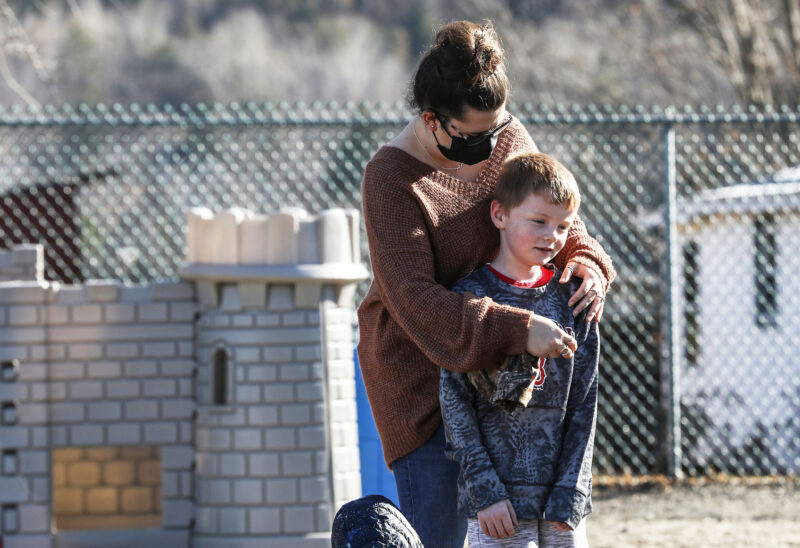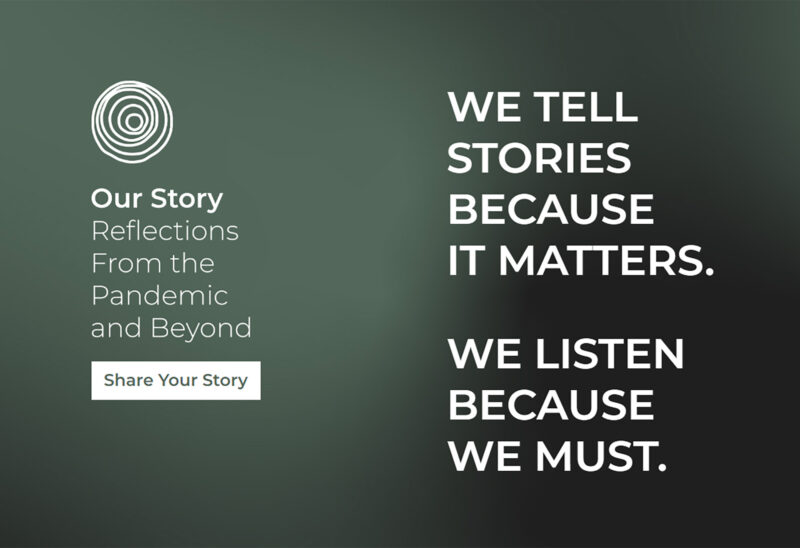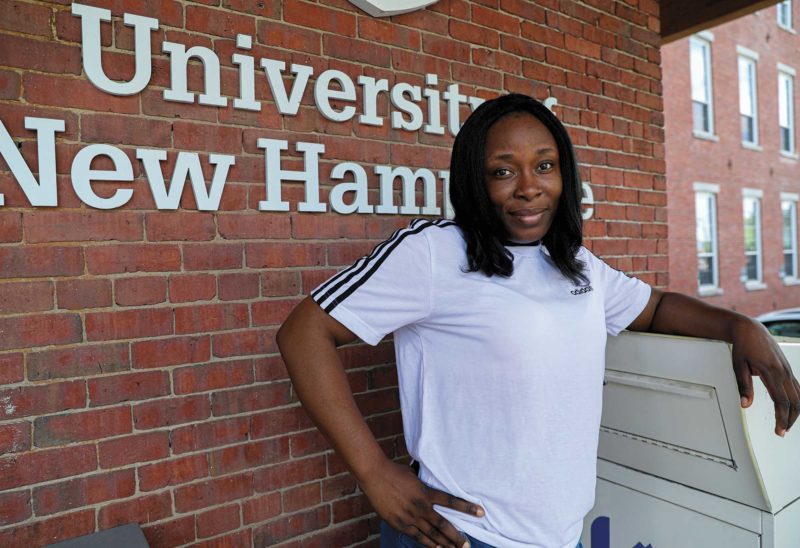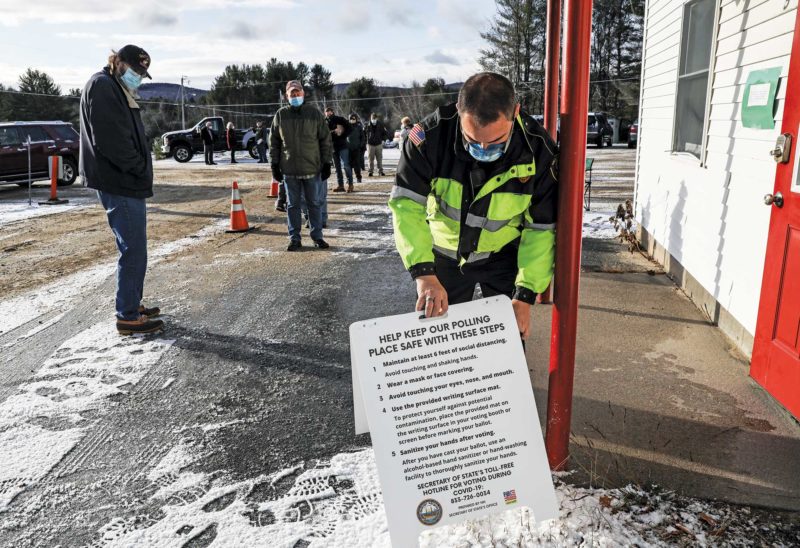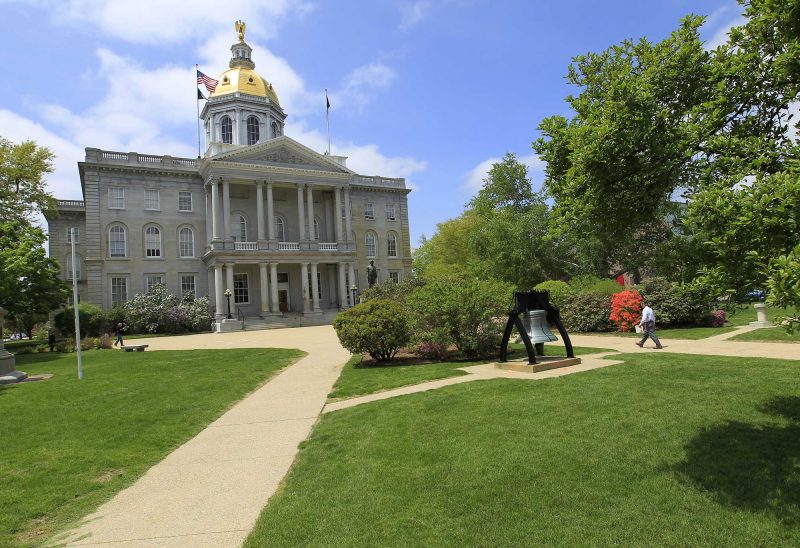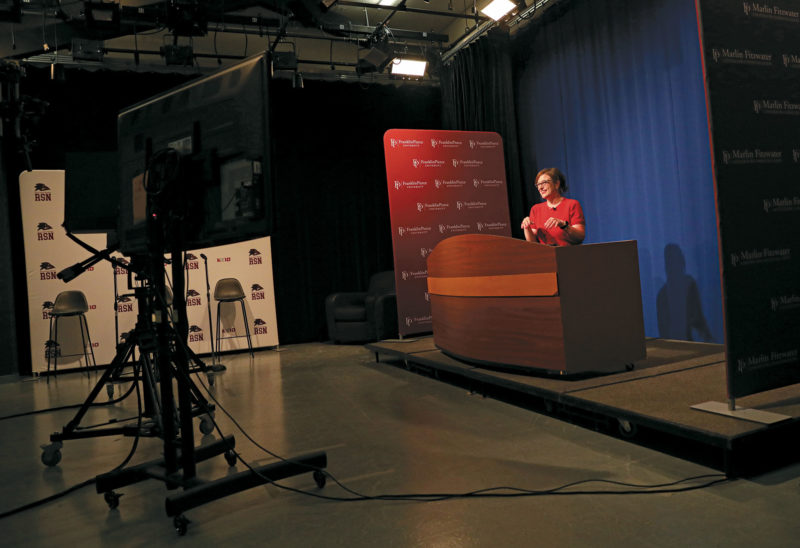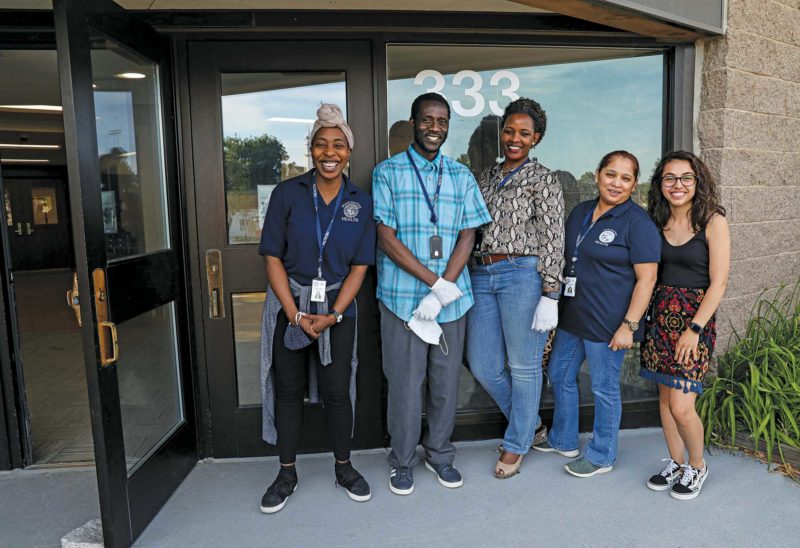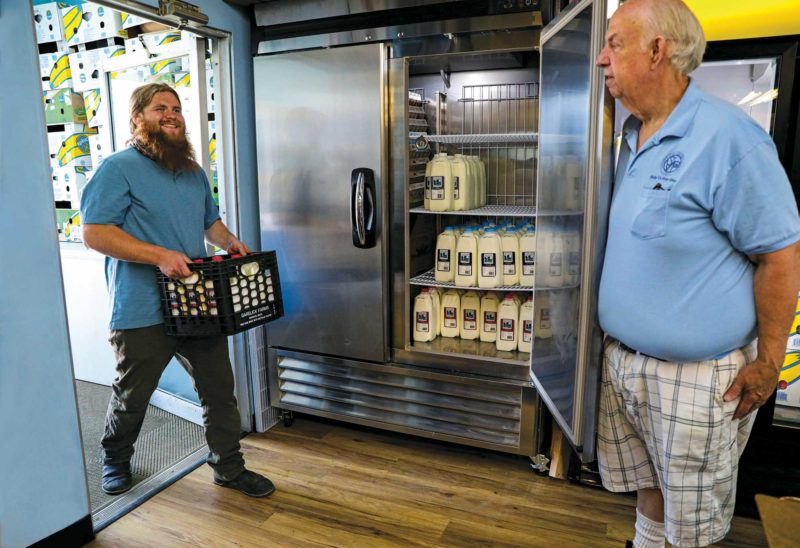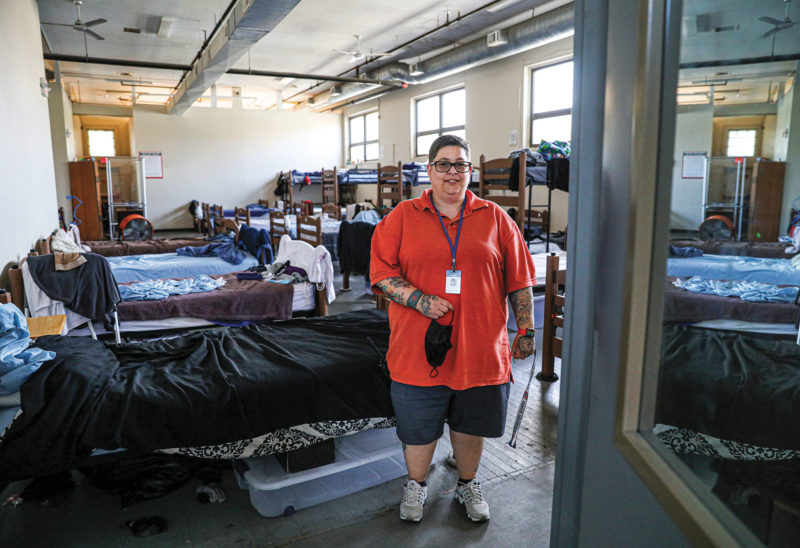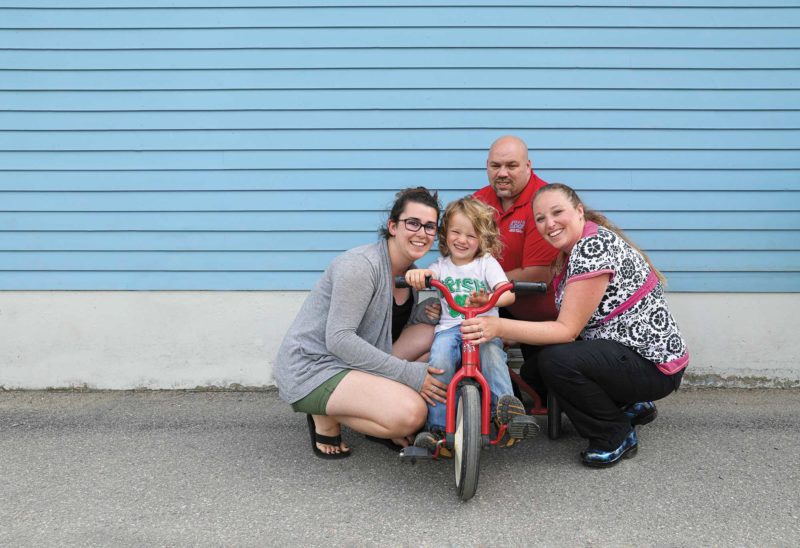Before the COVID-19 crisis hit and schools were closed, this was how Amber Roux’s weekdays went: up at 4:30 a.m., out the door at 5:30 for the 50-minute drive to Franklin and a day of back-to-back emergencies interrupted by crises and punctuated by classroom teaching. Many of the children who rely on her have had a lifetime’s worth of obstacles and traumas thrown at them before their tenth birthdays. Most days, her lunch consists of a cup of iced coffee.
Amber Roux is an intervention counselor at Franklin Middle School.
Amber’s position is part of the district’s Project AWARE program, an evidence-based approach to promoting student wellness and resiliency used in schools across the country and initially funded in Franklin by a federal grant. When that funding ran out, a grant from the Foundation (with contributions from 11 separate charitable funds) matched funds from the Franklin school district to retain one of two master’s-level intervention counselors for Franklin’s middle and high schools; a third was added back at the elementary school after additional state funding was released to municipalities in the fall. Amber and her colleagues provide services for families and work with community mental health centers to support Franklin’s children, helping them to succeed in school and reach their potential.
Many of Franklin’s children are shouldering complex burdens associated with poverty, family trauma, an acute opioid crisis, and chronically underfunded public schools. An increasing number are being raised by grandparents. Some are being raised by siblings who are only just beyond their own teenage years.
“These kids are very talented,” Amber said of her students. “We have some kids that are super invested academically. They are kind. They care a lot about being a good person. And they are resilient. It’s amazing to hear their personal struggles and challenges and see them still show up and do their best.”
When the coronavirus crisis hit and schools closed, Amber and her colleagues worried that many of those children’s struggles would be compounded: With no break from often-tumultuous households, inconsistent support for online learning and lack of access to in-school supports. Amber now meets over videoconferencing with students on a regular basis and works with families on basic skills around structure and supporting their children’s remote learning.
“We are doing our best to stay connected to every single kid, especially those who are at high risk and who we saw frequently at school,” Amber said. Even via video-chat, she said, “You can see they’re depleted. They’re stressed out, fatigued, and lonely — and with those emotions come higher levels of anxiety.”
At just under 9,000 people, Franklin is the smallest of New Hampshire’s 13 cities, a once-prosperous hub that has struggled to regain its footing since mills closed and the rail artery that connected it to Concord, Boston and Montreal was abandoned. While new development measures have shown recent glimmers of promise downtown, and generations of residents hang on to a scrappy pride of place, Franklin has the highest percentage of children eligible for free-and-reduced-price school lunch (a reliable measure of poverty) of any New Hampshire city — and the second-highest of any community in the entire state. The district’s high-school dropout rate is more than four times the state average.
It is often said that the COVID-19 crisis has laid bare existing inequities, and it has indeed hit Franklin hard — the city’s mayor recently reported that unemployment in the city is near 30 percent.
A 2017 Youth Risk Behavior Survey of Franklin Middle School students showed almost 30 percent of all girls had “seriously thought about killing themselves” — and almost a quarter had gone so far as to make a plan. Twenty-eight percent reported self-harming behaviors like cutting or burning.
We spent a day with Amber before the current crisis hit. All day, children filed into her small office, where she keeps the lights low and the vibe calm.
As Amber talked to a girl in baggy sweatpants who has contemplated suicide, her desk phone rang. A child who had endured significant trauma had punched a wall, seemingly out-of-the-blue, and was outside her office. She immediately made a plan with the girl to mediate a toxic situation that started in a locker room and spilled onto social media. Then she brought the boy in, gave him a snack and tried to work out what prompted him to punch the wall. As she talked to him, her phone rang again. A child who had had a cancer scare needed to talk. Later, a nine-year-old came in, all beautiful smile and dimples. His dad and his ex-girlfriend were fighting a lot, and he told her he really missed his mom, who died. “She was very sick,” he said, with heart-wrenching solemnity, “and no one could help her.” While Amber talked to him, her two-way radio alerted her that another child needed her. It was just a normal day.
Before Project AWARE was implemented, the district had one clinical social worker for 1100 kids in three schools. And problems left unaddressed escalated.
“We’re trying to fix generational trauma,” Amber said. “Sometimes, you feel like you’re climbing up a hill and someone is standing on your forehead. But I couldn’t imagine schools like this one not having someone in my position.”
Tony and Tammy Thibeault’s teenage grandson and granddaughter have lived with them in their small mobile home for the past ten months. The children’s mother, their daughter, died when the kids were small. The Thibealuts are retired, but Tony still works full-time as a shuttle bus driver to make ends meet. Tammy quit her job when the kids came to stay.
Tony said their grandchildren have endured a lot of trauma. Amber helps them during school and has coordinated for them to get mental health services through community mental health practitioners.
“They’ve got a lot of anger built up and they both rely on Amber a lot,” Tony said.
And, he said, she has helped the whole family. “I feel better when I talk to her,” Tony said. “She reassures me. She knows what we are going through.” Amber coordinates holiday food baskets with the local Elks Club, and makes sure families in need, like the Thibeaults, get holiday dinners. At Christmas, gifts and clothes arrived for the kids.
Tony and Tammy knew that Amber’s position was dependent on outside funding.
“When she was here again this year, I was ecstatic,” Tony said. “I didn’t know what we were going to do without her.”
When 13-year-old Melissa (not her real name) came to Amber some months ago and confessed to a suicide attempt, Amber went into high gear — calling Melissa’s family, coordinating services for her through Riverbend Community Mental Health, talking to Melissa throughout the school day. Now, Melissa has a safety plan in place and knows where to go for support.
“I could trust her with anything,” Melissa said of Amber. “And I realized that suicide isn’t the only option. There is help.” Now, Melissa has aspirations to two careers that require the same keen perceptions of people that Amber models: a counselor or an FBI agent.
“I don’t think Melissa would have gotten through her school days without having that support there,” Melissa’s mom said.
In addition to seeing kids one-on-one, Amber teaches a “Healthy Relationships” class required school-wide. Project AWARE counselors also teach substance misuse prevention classes. Middle-schoolers in Franklin learn mindfulness, conflict resolution and healthy communication and participate in an evidence-based suicide prevention program. Amber helps facilitate a youth initiative with the Mayor’s Drug Task Force and coordinates other services – like a clothing and supply “closet” where kids can “shop” for things like winter jackets and toothbrushes, and a program through the local food pantry to provide kids with groceries to get them through the weekend.
(On the day we spent with Amber, she handed out food all day to hungry children. When granola bars came out during one of her classes, a 12-year old being raised by his 87-year-old grandma quickly clutched three of them to his narrow chest. By a conservative estimate, Amber hands out $20 worth of food on a single day. Who buys all that food? Amber, her mom and school principal Ken Darsney chip in for it from their own pockets.)
Through Project AWARE, teachers have learned about the effects of trauma on children — and how to understand and manage the behaviors that kids show up with in their classrooms. Teachers and staff have been trained to identify warning signs of a mental health crisis and respond swiftly, appropriately, and with compassion.
“Among the transformational things we have done here is getting our teachers to understand our kids’ trauma needs,” said Darsney. “The whole ‘it-takes-a-village’ thing really does exist here.”
The three mental health clinicians in Franklin’s schools have worked one-on-one with almost half of all children in district at least once. Since Project AWARE has been implemented, office discipline referrals are down in the middle school, which means kids are spending more time in the classroom and on schoolwork. Social-emotional screening has been implemented for incoming kindergarteners, so concerns can be addressed early.
Amber said many of the children she speaks to — having grown up in the maelstrom of an opioid crisis – are adamant about steering clear of drug use. YRBS data show that high school students in Franklin have very low rates of recreational prescription drug use — with just 1.7 percent of students reporting such use in 2017, significantly lower than the statewide average.
The Franklin school district is working on sustainability plans to keep Project AWARE in place. The Foundation is also funding advocacy efforts to expand Medicaid coverage for in-school services like those provided by clinicians like Amber and her colleagues — and help cash-strapped districts like Franklin shoulder the funding burden.
Amber and her colleagues are deeply worried about the effects of the current crisis on their students. “The fact that child protection calls are down 50 percent makes me scared and nervous,” Amber said.
The other day, Amber got in her car and followed the district bus that delivers meals around Franklin for children who rely on free-and-reduced-price lunch for an important part of their daily nutrition. She was there delivering art supplies — and to put eyes on her students, whom she has not seen in-person for months.
Parents, she noticed, have aged, stress etched in their faces.
“I did get to see some of the kids, and I just wanted to hug them,” she said. “It took everything in me not to jump out of the car. I said ‘Please, please, please reach out to me if you need support.’ And right after, some of them did. We’re doing everything in our power to keep connections alive.”
Suicide is not the answer. There is hope. If you, or a loved one, are thinking about suicide, please call the National Suicide Prevention Lifeline at 800-273-TALK (8255).
For more information on the Charitable Foundation’s work in the area of children’s behavioral health, contact Traci Fowler, senior program officer, at 225-6641, ext. 243 or Genpv.Sbjyre@aups.bet.








